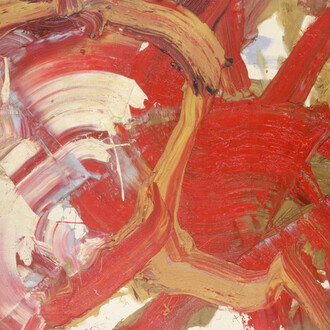In producing her work, Kashihara references classic techniques of traditional Western Painting, first applying her own formula of semi-oil based paint as an undercoat to the canvas. Upon this original canvas, she uses oil paint applied in a thinly diffused manner reminiscent of Japanese nihonga painting, while also incorporating mixtures of tempera to create a unique depth of color. Within the world of her works, scenes from both reality and the spaces of inner imagination gently coalesce and are interwoven. In the backdrop of these works is Kashihara's interest in the 'distance' between the internal and external, as an artist who left Japan and moved to Germany where she has since continued to develop her practice. Distance in this context includes they physical distance between Japan and Germany, the spiritual distance between the respective cultures, and the distance between herself as a Japanese person and herself while in Germany. Such introspective explorations are symbolically expressed through motifs of caves, holes, mountains and lakes, which she repeatedly takes up within her work. Through this process of sublimation, she further serves to evoke the fundamental energies in nature that lie dormant within the great depths of the earth.
The title of this exhibition "Polar Green," is a neologism inspired by her four-day trek across New Zealand's famous tramping route, the "Milford Track" (spanning a total length of 54km). The "Milford Track" is a beautiful and remarkable place where various worldly landscapes can be observed to the extent that it could be described as an "epitome of the world," traversing desert lands, rainforests, an alpine pass, and volcanic valleys. Witnessing the fleeting scenery that changes with each and every step, she had in particular felt deeply moved by the surprisingly vivid, almost mint green hues of a lake she encountered -the experience of which translates to this title.
Kashihara states as follows. "At the Milford Track, access to the trail is regulated, allowing a maximum of 20 walkers to start the trail per day. While trekking I could not feel any signs of human presence or civilization, so much so that it was strange I didn't encounter any dinosaurs. I trekked across a piece of the former Gondwana continent, on a trail where it is said to rain throughout the year. Climbing the mountains while soaking wet from rain had seemed to reveal to me what nature in fact should be, and all the while, the greenery around me glistened vibrantly."
Kashihara's experience in the vast landscapes of nature had also presented an influence on her practice. She states, "In the past, when I'd paint I was within my safety zone. It was similar to digging a hole, in the sense that I was venturing deeper and deeper inside myself. Since returning from this trip however, I have been engaging in a process of filtering various external incidents and experiences within myself, and then transmitting them to the outside again through my inner self."
Kashihara's new works demonstrate glimpses of dynamic brushstrokes that evoke the energies of a primeval forest against delicate depictions of various plant life.
This exhibition features the artist's new jungle series that draw inspiration from the primeval forests she observed while camping over the past two years in Malaysia, Amami Oshima, and New Zealand. Such landscapes bring together her own memories and imagination, things she had recently observed, and scenes that reside within herself, ultimately coming to manifest through a repeated process of painting and erasing. Marking the artist's fifth solo presentation with Tomio Koyama Gallery since her previous showing three years ago, viewers are invited to engage with the world of Kashihara's works in which the refreshing atmosphere and transparency of the primeval forest coexist with a unique sense of richness.
















